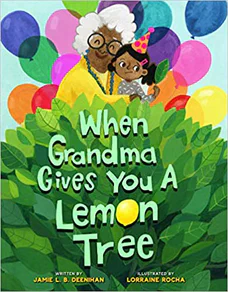When Grandma Gives You a Lemon Tree
Written by Jamie L.B. Deenihan
Illustrated by Lorraine Rocha
32 pages
•
Published 2019 (Union Square Kids)

Recommended Age Range: Kindergarten through 3rd grade.
Publisher's Summary:
“When life gives you lemons, make lemonade.” In this imaginative take on that popular saying, a child is surprised (and disappointed) to receive a lemon tree from Grandma for her birthday. After all, she DID ask for a new gadget! But when she follows the narrator’s careful—and funny—instructions, she discovers that the tree might be exactly what she wanted after all. This clever story, complete with a recipe for lemonade, celebrates the pleasures of patience, hard work, nature, community . . . and putting down the electronic devices just for a while.

Dr. Annie's Takeaways
Recommended for: This book is super funny and adorable, and it delivers the message that being open-minded in the face of disappointment can lead to unimagined possibilities. It goes deeper than this, though. The story ends with the little girl using the money she earns from her lemonade stand (yes, life gave her lemons and she made lemonade) to buy plants for a community garden rather than the robot dog she initially wanted. This could be an entry into conversations about money-related values and about building community. This book, along with its companion book When Grandpa Gives You a Toolbox
, is available in English and Spanish.
Would a child like it? All kids have received a present they absolutely did not want, and this funny, heartwarming book will speak to them.
Tone: Funny, sweet
Story Quality: This story is a delight. It starts with the premise of a cliched expression (“when life gives you lemons, make lemonade”) and turns it into a funny, fresh, and poignant story. Written in second person, the narrator instructs the reader in a very funny way to react politely when one receives a lemon tree for a birthday present rather than the robot dog, drone, phone, or computer that one requested. It then goes on to teach the reader how to care for a lemon tree, and ultimately shows how with lemons, one can make lemonade, host a lemonade stand and eventually buy whatever one wants. There’s another important layer of depth to the story, though, that makes this story shine. Over the course of the book, the girl pictured in the illustrations grows fond of her lemon tree (she names it Lola!), has fun making lemonade with her grandmother, and ultimately uses the money she makes to buy more plants and create a community garden that all of her neighbors can enjoy. I SO love this ending. Rather than the story having a message of the value of pulling oneself up by the bootstraps/ teaching a man to fish, etc., it has message that being open-minded leads to being less self-centered and more open to personal growth and meaningful community connection.
Illustrations: Beautiful, vibrantly colored watercolor illustrations with tons of fun details and visual humor.
Representation: The narrator speaks to “you” the entire story, so the representation occurs almost exclusively in the illustrations. The main character is a Black girl (receiver of the lemon tree). She has a Black grandmother (giver of the lemon tree). The girl and her grandmother live in a city with neighbors of many different races and ethnicities. At the end of the story the girl plants a community garden in a small plot of land between two buildings on her street. This book is available in English and Spanish.
Psychological Practices: This story is a really fun way to talk about coping with disappointment by being open-minded and considering that a setback may lead to unimagined possibilities. It is also a funny and super non-preachy way to prepare children to appropriately respond when they receive presents they aren’t excited about.
Concerns: None
